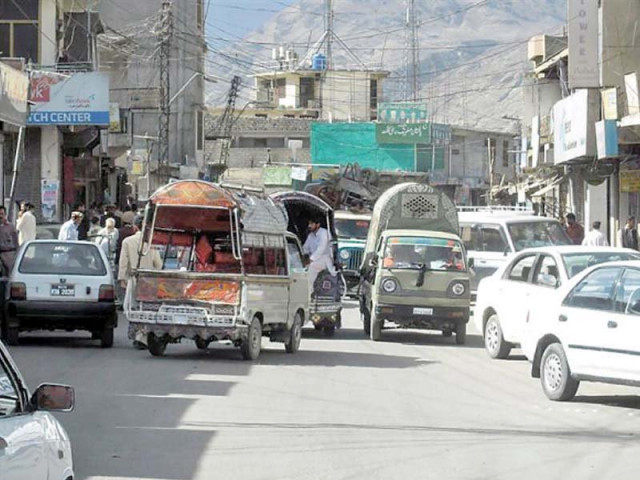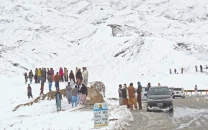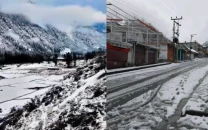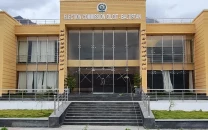Bumper to bumper: Gilgit’s streets slowly getting clogged with traffic
Residents apprehensive about expected exponential increase in traffic with CPEC

Vehicles are stuck on a road in Gilgit town. PHOTO: FILE
But that has changed in recent years with an influx of non-custom paid (NCP) cars in the region. Such is their impact that traffic jams on the narrow two-lane thoroughfares of Gilgit, the capital of G-B, have become a regular sight.
According to government data, there are around 40,000 cars in the 10 districts of the region. Moreover, there are at least 5,500 NCP cars, which have been smuggled into the region through Khyber-Pakhtunkhwa via Karakoram highway. To make matters worse, thousands of vehicles from other parts of the country come during the tourist season in the summer.
“Think Gilgit, and images of fresh springs, glaciers and snow-capped peaks come to mind,” says Ismail Khan, a resident of Gilgit.
“But that’s not the case anymore. Noise and air pollution has left its marks everywhere,” the 45-year-old said.
The situation is likely to compound when the China-Pakistan Economic Corridor (CPEC) becomes fully operational. Many believe that the convoys of cargo trucks undertaking the 450-kilometre journey through G-B will ruin the natural beauty of the region in addition to adding to the vehicular load on the already congested roads of the region.
“It will become severe when CPEC is operational,” Ismail said.
Congested lanes
The influx of NCP cars in the region had proved to be a bane for people in the landlocked region.
Comparatively better road connections within the region and availability of NCP cars meant that people had better access to travel facilities in the rugged region.
The NCP cars also helped locals in their small transportation businesses, most of which depend on such cars for their livelihood in the absence of established industries in the region.
“But the facility turned distress in just five years as an abrupt increase in the cars causes traffic jams,” says Ismail, who uses his small Suzuki van to transport supplies to vendors in Gilgit’s markets.
“You can’t find a place to park the car to drop off the supplies to vendors as the roads are narrow,” he lamented.
Ismail, though, is not interested in debates about the political system in the region – which was given a province-like status only in 2009 – is mature enough to deliver or if the bureaucracy supports the political government.
He, like the other 1.5 million residents of the landlocked region, know that traffic issues are getting complicated.
Thinly staffed excise dept
Like the provincial setup, the department of excise and taxation in the region is also new, having been formed in 2009 under the Empowerment and Self-Governance Order 2009.
The department, though, has just five officers who are supposed to deal with thousands of vehicles in the region.
“The situation has badly affected the performance of the department as it lacks the legal cover to crack down on even stolen vehicles,” Senior Official Abdul Waheed Shah told The Express Tribune.
Shah worked as the secretary of the excise department for a while before he was recently transferred out.
“Due to the lack of relevant laws, we are unable to confiscate vehicles smuggled into the region,” he said.
Meanwhile, Superintendent of Traffic Police Tahira Yasub said they lacked resources and manpower to handle the mess.
“The issues are many but resources are scarce,” Yasub said.
On the other hand, Faizullah Faraq, the official spokesperson for G-B government said that they wre evolving a strategy to settle issues relating to traffic in the region.
Published in The Express Tribune, February 24th, 2017.


















COMMENTS
Comments are moderated and generally will be posted if they are on-topic and not abusive.
For more information, please see our Comments FAQ